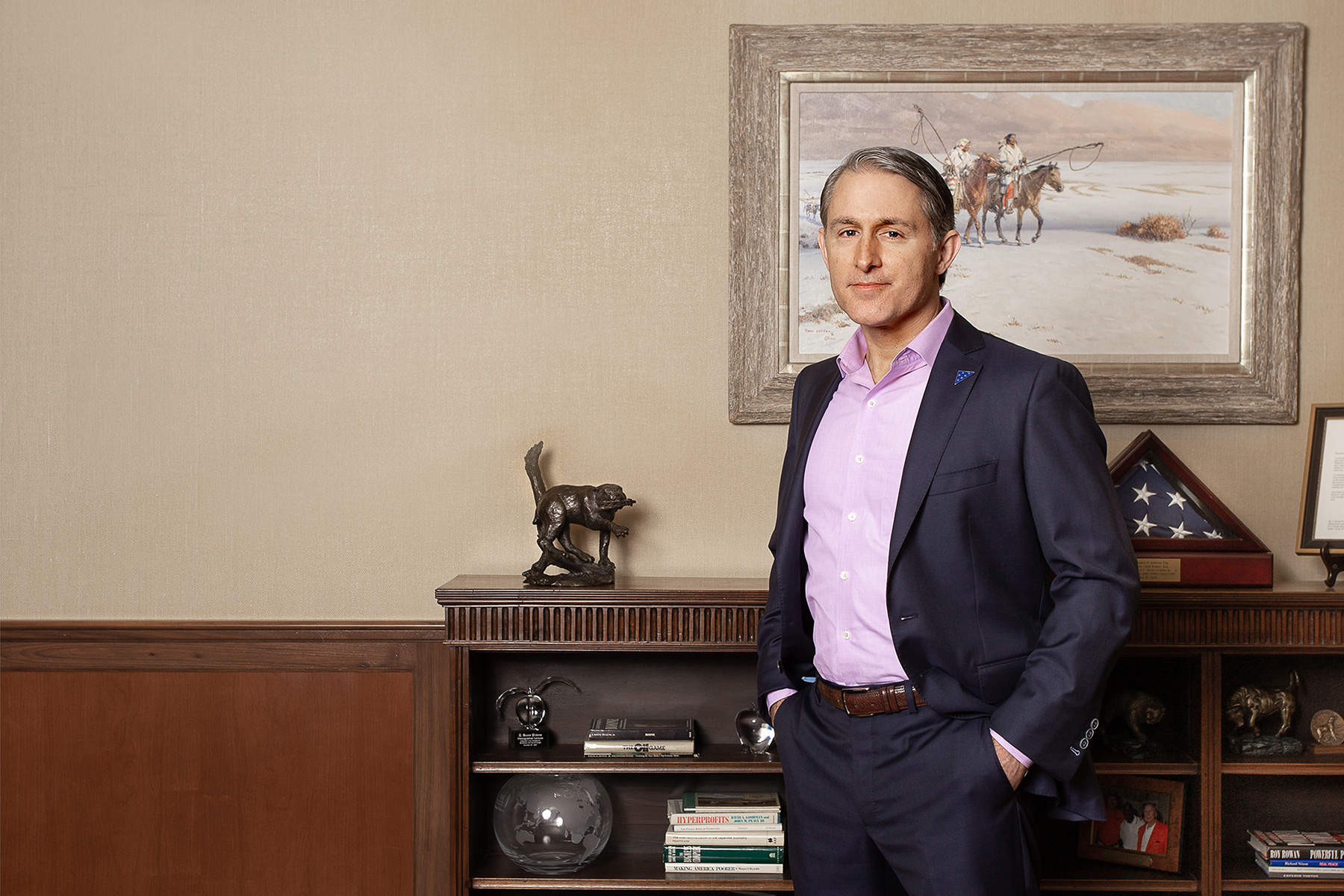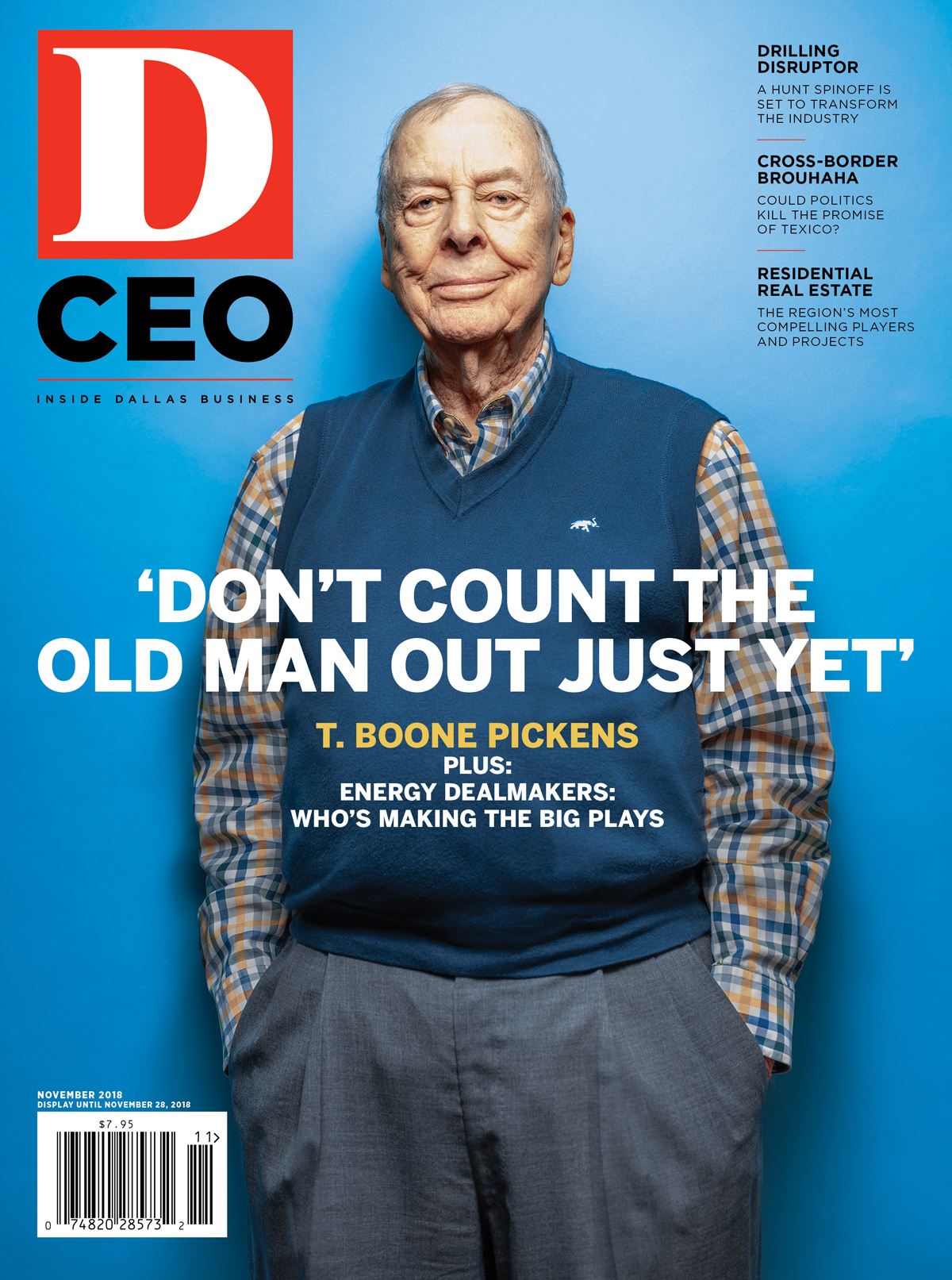Why you need to know him: Because Toby Loftin and his team created an innovative energy exchange-traded fund that reflects the future of energy. The 45-year-old began managing the family wealth of T. Boone Pickens in 2010, serving on the energy icon’s investment committee. Three years later, Loftin founded BP Capital Fund Advisors, a public investment management arm, and the TwinLine mutual funds. He formed BOON, an exchange-traded fund, or ETF, in February 2018.
Loftin spent many late nights in development mode, painstakingly creating the intellectual underpinnings of BOON. The ETF tracks an index called the NYSE Pickens Oil Response Index, which officially launched in September 2017. It was the first time in the NYSE’s history that it co-branded an index with a named individual.
According to Patrick Hurley, chief compliance officer and chief operating officer of BP Capital, Loftin’s ability to build a team and corral the many resources needed from Pickens played a critical role in the concept coming together. “Toby operates from a deep knowledge of energy and financial markets within the broader energy ecosystem,” Hurley says. “He’s a leader who is willing to swat the nest and shake things up.”
Energy markets are changing, and new supply and demand dynamics are emerging, including advancements in technology.
The Pickens Plan, Boone’s policy proposal to achieve American energy independence, includes an emphasis on the demand side of energy. Think natural gas in power generation, which encompasses a production side but also an end-user or consumer side. Uniquely, the TwinLine energy mutual fund includes end-users as part of its investment universe. Many, if not most, energy funds focus on energy producers like the Exxons and shale players like Pioneer Natural Resources, or a segment such as midstream (pipelines) or downstream (refiners) firms. “No other fund in the Morningstar Energy Equity category approached energy like we did,” says Loftin, a U.S. Air Force Academy grad who earned a master’s degree in finance from The University of Texas at San Antonio. “Our approach [to the mutual funds] proved valuable and prescient, as proven in its performance versus peers. Since inception, it has earned accolades.”
A huge shift occurred in energy when the U.S. became a major, sustained producer of oil and gas. The shale oil and gas basins in Texas, Montana, the East, and the Rockies offered a new path to a larger role in energy production. This year, America is expected to average 10.8 million barrels per day (bd) of crude oil production and 11.8 million in 2019. In 2008, it was 5 million bd, roughly half. Loftin explains: “The U.S. short-cycle barrel [shale] represents the lion’s share of crude oil supply growth globally over the last several years. It has affected OPEC policy and caused Russia and Saudi Arabia to cooperate in a way that heretofore was unknown.” An abundance of U.S. natural gas is allowing certain industries to enjoy a relative cost advantage over global competitors. Energy markets are changing, and new supply and demand dynamics are emerging, including advancements in technology.
BOON, the newly developed ETF, represents just how much has changed in energy, including the advent of shale. Most funds that track oil and production firms swing with the booms and busts. The ETF is designed to benefit from the upside of oil prices but also mitigate the downside. Loftin calls its features “accordion-like,” moving in response to oil prices but using “screens” to determine if a firm is eligible to be included in the index. Oil prices reflect geopolitics, U.S. and global economic activity, oil and gas production costs, and demand.
Interestingly, the ETF is designed to capture changes in energy’s future, not just the oil patch play. “That’s evidenced by the fact that First Solar made it into the index by the established rules and criteria,” Loftin says. “It’s there because of the beginning of the change toward renewable energy.” The energy tech sector is represented in the index, too.
Benchmarking is a way for investors to discern how a fund holds up against peers and the market. Loftin says investors often ask about the best index benchmark for the TwinLine energy fund. Until the NYSE Pickens Oil Response Index, the best publicly available index benchmarks were the S&P 500 Energy (XLE) and S&P North American Natural Resources Index (IGE). But neither of those two indices represented the unique feature of including the end-users segment, Loftin says, referring to industrials like the $7.8 billion Dover Corp. and Irving-based materials firm Celanese.
“Our team set out to design and build an intellectually honest benchmark in late 2015,” Loftin says, adding that investors who consider the merits of the oil response index express belief that the team is “on to something significant.” He believes that the performance of the oil response index and BOON will corroborate that view over time.
The making of a modern, relevant ETF doesn’t happen overnight. “I earned Boone’s trust over years of managing his family’s midstream energy holdings,” Loftin says. “We are redefining energy investing—not the sector, but the approach to the sector.”






